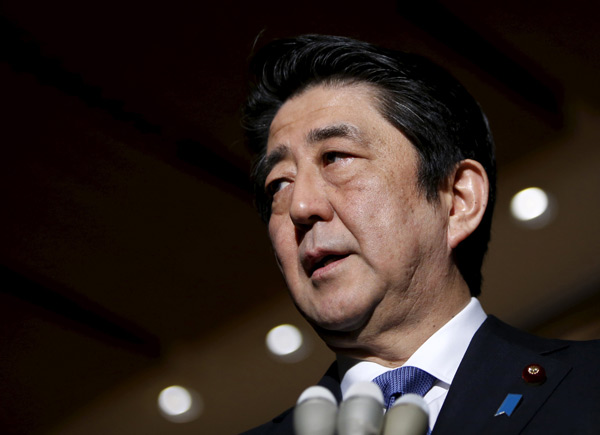 |
|
Japan's Prime Minister Shinzo Abe speaks to reporters at Abe's official residence in Tokyo, Japan, January 28, 2016. [Photo/Agencies] |
In advance of the G7 summit, which the island nation will host this month, Japan is increasing its efforts to interfere in the South China Sea issue.
The issue was raised by Japan's Prime Minister Shinzo Abe and Foreign Minister Fumio Kishida during their trips to Europe and Southeast Asia.
In talks with the leaders of Italy, France, Belgium, Germany and the United Kingdom, Abe never forgot to refer to the South China Sea.
Kishida also sought support from the Association of Southeast Asian Nations. In his speech in Bangkok, Thailand on May 2, Kishida spoke of the "rule of law", shared values and "maritime security" in the South China Sea.
Playing at being the spokesman of ASEAN, Kishida called for the early conclusion of a code of conduct for the South China Sea.
Japan, which has no territorial claims in the waters, has been mounting a campaign against China.
Like the United States, it is both fueling and exploiting the tensions in the disputed waters to advance its own economic and strategic interests in Southeast Asia.
Japan is expanding its partnerships and coalition-building in Southeast Asia in what has been called its "maritime pivot" to Southeast Asia.
Both Abe and Kishida have toured all 10 ASEAN countries-Abe is the first Japanese prime minister who has visited all while in office. They have put priority on security issues during their trips, with the goal of containing China.
After meeting with Thai Prime Minister Prayuth Chan-ocha in Bangkok, Kishida said at a press conference that it is important for ASEAN to be united in responding to China's "assertiveness" in the South China Sea.
Kishida also told Lao Prime Minister Thongloun Sisoulith about Tokyo's desire to work closely with the landlocked country to reduce tensions over the South China Sea issue.
Laos is this year's chair of ASEAN, and Sisoulith has been invited to visit Japan for an outreach session of the G7.
Japan's Defense Ministry announced in January that it would reroute military aircraft returning from anti-piracy operations in the Horn of Africa. Instead of refueling in Singapore and Thailand as they have done previously, Japan's two P-3 Orion maritime patrol and anti-submarine aircraft will land in places such as Vietnam, Malaysia and the Philippines.
The aircraft carry highly sophisticated equipment designed to monitor and track vessels, including submarines. It is believed that the rescheduled refueling stopovers are part of Japan's broader plan to establish a more permanent presence in the region.
And Japan has increased the number of joint bilateral and trilateral military exercises, patrolling and port visits to maritime countries in Southeast Asia.
In January 2013 Abe listed five principles of a new "doctrine" including the maintenance of political norms and civic rights, rule of law at sea, and free and open economies. The doctrine is widely viewed as implicitly targeting China, and as a sign of the geopolitical game Japan wants to play.
With these strategic calculations, Japan is loudly "returning" to the region and has been busy trying to drive a wedge between China and ASEAN countries.
The author is China Daily Tokyo bureau chief. caihong@chinadaily.com.cn

I’ve lived in China for quite a considerable time including my graduate school years, travelled and worked in a few cities and still choose my destination taking into consideration the density of smog or PM2.5 particulate matter in the region.